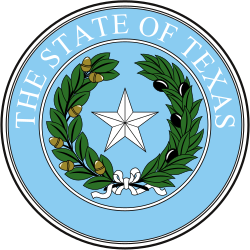2000 Texas Senate election
| |||||||||||||||||||||||||
15 of the 31 seats in the Texas State Senate 16 seats needed for a majority | |||||||||||||||||||||||||
|---|---|---|---|---|---|---|---|---|---|---|---|---|---|---|---|---|---|---|---|---|---|---|---|---|---|
| |||||||||||||||||||||||||
 Senate results by district Republican hold Democratic hold No election | |||||||||||||||||||||||||
| |||||||||||||||||||||||||
| Elections in Texas |
|---|
 |
|
|
The 2000 Texas Senate elections took place as part of the biennial United States elections. Texas voters elected state senators in 15 State Senate districts. All of the seats up for this election were for two-year terms, with senators up for re-election in the 2002 elections. State senators typically serve four-year terms in the Texas State Senate, but all Senators come up for election in the cycles following each decennial redistricting. The winners of this election served in the 77th Texas Legislature.
Background
[edit]The Republican Party had held the State Senate since the 1996 elections.[1]
Results
[edit]Despite the highly contentious 2000 presidential election taking place at the same time, in which Republican governor George W. Bush won nearly 60% of the vote in Texas, Republicans failed to expand their narrow majority in the Texas Senate. Only one seat saw a new member elected, a seat Republicans held after one member retired. Republicans had heavily targeted Democrat David Cain, who represented an increasingly Republican-leaning district in and east of Dallas, but he won re-election by a larger than expected margin, maintaining the chamber's composition.[2]
Results by district
[edit]| District | Democratic | Republican | Libertarian | Total | Result | ||||
|---|---|---|---|---|---|---|---|---|---|
| Votes | % | Votes | % | Votes | % | Votes | % | ||
| District 2 | 100,181 | 53.18% | 88,212 | 46.82% | - | - | 188,393 | 100.00% | Democratic hold |
| District 3 | 98,976 | 39.36% | 152,514 | 60.64% | - | - | 251,490 | 100.00% | Democratic hold |
| District 7 | - | - | 219,835 | 100.00% | - | - | 219,835 | 100.00% | Republican hold |
| District 8 | - | - | 225,369 | 100.00% | - | - | 225,369 | 100.00% | Republican hold |
| District 9 | - | - | 207,079 | 100.00% | - | - | 207,079 | 100.00% | Republican hold |
| District 10 | - | - | 187,302 | 100.00% | - | - | 187,302 | 100.00% | Republican hold |
| District 12 | 187,302 | 75.18% | 61,846 | 24.82% | - | - | 24,9148 | 100.00% | Democratic hold |
| District 14 | 185,478 | 81.95% | - | - | 40,847 | 18.05% | 226,325 | 100.00% | Democratic hold |
| District 15 | 95,826 | 65.06% | 51,465 | 34.94% | - | - | 147,291 | 100.00% | Democratic hold |
| District 21 | 106,089 | 66.46% | 53,547 | 33.54% | - | - | 159,636 | 100.00% | Democratic hold |
| District 24 | - | - | 130,913 | 100.00% | - | - | 130,913 | 100.00% | Republican hold |
| District 25 | - | - | 283,857 | 87.43% | 40,806 | 12.57% | 324,663 | 100.00% | Republican hold |
| District 26 | 105,771 | 100.00% | - | - | - | - | 105,771 | 100.00% | Democratic hold |
| District 27 | 94,042 | 100.00% | - | - | - | - | 94,042 | 100.00% | Democratic hold |
| District 29 | 101,045 | 100.00% | - | - | - | - | 101,045 | 100.00% | Republican hold |
| Total | 810,279 | 31.73% | 1,661,939 | 65.08% | 81,653 | 3.19% | 2,553,871 | 100.00% | Source:[3] |
References
[edit]- ^ "Rep. Stockman loses in Texas Congress runoff GOP claims majority in one house of state legislature, 1st since 1872". Baltimore Sun. December 12, 1996. Archived from the original on March 17, 2023. Retrieved March 17, 2023.
- ^ Ramsey, Ross (November 13, 2000). "A Truly Fantastic Week for Political Junkies". The Texas Tribune. Archived from the original on March 17, 2023. Retrieved March 17, 2023.
- ^ "Race Summary Report - 2000 General Election". Texas Secretary of State.
